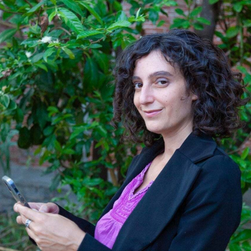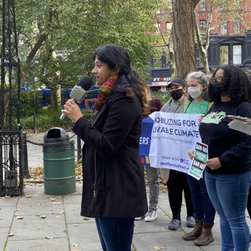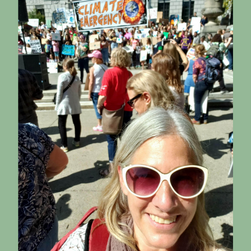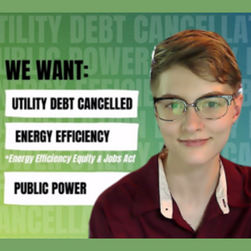Alliance for a Green Economy (AGREE) works for safe, affordable energy and the development of a green economy in New York State. Our goal is a prosperous, safe, and healthy New York, fulfilling the promise of conservation, energy efficiency, and safe, clean renewable energy sources to end our state’s reliance on wasteful and environmentally destructive forms of energy. The Alliance works to promote this transition to a carbon-free and nuclear-free future and educates the public about alternatives that can revitalize the economy and safeguard human health and the environment.
Our Team
Meet our team of changemakers, experts, and rabblerousers.
Jessica Azulay
Executive Director

Jessica Azulay, with more than 20 years of experience in multi-issue grassroots organizing, has led AGREE since 2011. Jessica is a published author on participatory workplace practice and movement strategy. They graduated from Sarah Lawrence College focusing on political economy and international economics.
Pronouns: she/they
Avni Pravin
Deputy Director

Avni Pravin joined AGREE in February 2021 to continue working towards a just and equitable transition. Her interest in conservation and outdoor education took her to the University of Oregon, where she obtained an M.S. in Environmental Studies while learning about the inequities of climate adaptation and mitigation strategies deployed by states and cities. Previously, she managed community solar programs and conducted research on barriers to low-income solar access at Solstice Initiative.
Pronouns: she/her
Andra Leimanis
Communications and Outreach Director

Andra Leimanis came to AGREE in 2016 with a background in plant ecology research and public relations. Her public relations experience comes from several years at a Manhattan PR firm, and environmental advocacy skills were honed during the grassroots movement to ban hydrofracking. Andra holds a M.S. from the SUNY College of Environmental Science and Forestry.
Pronouns: she/her
Lindsay Speer
Director of Community Programs and Operations

Lindsay joined AGREE in 2017 and is the Campaign Director for the HeatSmart CNY campaign. She has a B.S. in Natural Resources from Cornell University and a Masters of Environmental Law and Policy from Vermont Law School. She comes to AGREE after fifteen years of working on behalf of the Onondaga Nation and others on a variety of environmental justice issues in Central New York, including the successful campaign to prevent fracking from decimating our lands, waters, and communities.
Pronouns: she/they
Amber Ruther
Organizing Coordinator

Amber Ruther joined AGREE in March 2021. They graduated from Boston College, where they organized for fossil fuel divestment. They have also organized with the Public Power New York coalition to win a publicly owned, democratically controlled energy system as key to an affordable and just transition to renewable energy and renewable heat.
Pronouns: they/she
Oluwatosin Arodudu
Executive Assistant

Oluwatosin joined AGREE in May 2022 as an experienced Finance and Administrative Officer and publisher. Oluwatosin has a passion for environmental sustainability and empowering and coaching women. Before coming to AGREE she was a Finance and Administrative Officer at World Mission Agency Dublin.
Pronouns: she/her
Jordan Parés-Kane
Research Fellow

Jordan joined AGREE July 2022 and is developing AGREE’s Resource Library. She is a social scientist with a background in climate mitigation and adaptation and has worked both in NYS and internationally on sustainable development projects. Her passion for the environment and its relation to social justice led her to receive her B.S from Cornell in Environmental Science and M.A from Columbia in Climate and Society.
Pronouns: she/her
Principles of Unity
AGREE’s founding members wrote the following principles of unity in 2011 to ground our work:
- It is imperative that our nation begin an aggressive and visionary transition to a carbon-free and nuclear-free energy supply and a sustainable future that will preserve human health and the environment for ourselves and future generations.
- The biggest obstacles to achieving the transition to a carbon-free and nuclear-free economy are political and social inertia, not technical or economic feasibility. The proper government policies and investments are needed to mobilize and guide the country toward this important societal goal.
- Our continued reliance on fossil fuels and nuclear power is inconsistent with these objectives, producing conflict between economic forces and our social and environmental well-being.
- The burning of fossil fuels is already a major source of pollution and is a main contributor to global climate change, which threatens economic and social stability and the future of life on earth as we know it. The extraction and burning of fossil fuels causes unacceptable environmental destruction and endangers entire communities’ way of life.
- Nuclear power generation poses unacceptable threats to human health, security, and the environment, through devastating nuclear accidents, routine radioactive releases and leaks, nuclear proliferation, and the production of radioactive wastes that must be managed for hundreds of thousands of years. The extraordinary costs of nuclear energy make it economically wasteful, diverting resources away from climate-protection measures.
- We reject dependence on expensive, unhealthy, and inefficient energy sources. Increasing energy conservation and efficiency at all levels — individual, commercial, industrial and governmental — will significantly lower energy costs, freeing up economic resources and driving innovation in new technologies.
- Sustainable renewable energy, including local distributed generation, coupled with efficiency and conservation, will reduce our reliance on fossil fuels and nuclear power and create jobs in our communities.
- The economic, social, and environmental imperatives facing our society are not in conflict with one another. The transition to an energy system that provides substantial economic, social and environmental benefits will contribute to a prosperous and stable economy that fulfills our country’s promise of opportunity and justice for all.
- The transition toward better energy sources must be built on a foundation of social and environmental justice, which provides worker protections and quality jobs to all as well as a just transition for those in displaced industries.
- The transition toward better energy sources needs a strong democratic process, in which the rights and interests of local communities are supported. It is the right and responsibility of all New Yorkers to engage in this process, to have a seat at the table, and to benefit from the outcome.
- Publicly controlled utilities as well as privately owned businesses that embrace sustainable, clean, renewable and affordable energy goals should be supported and encouraged as a vital force in effecting this transition.
- New York should lead the way in this transition. Our state has already taken definitive steps in this direction, and we have the resources, means, and opportunity at hand to do much more. What is needed is a clear vision of what a truly green New York will look like, a well-defined plan for how to get there, and the political will to achieve it. As with so many other things, if New York starts, the rest of the nation will follow.
